2022届高考英语二轮复习:定语从句关系代词和关系副词课件(52张)
文档属性
| 名称 | 2022届高考英语二轮复习:定语从句关系代词和关系副词课件(52张) | 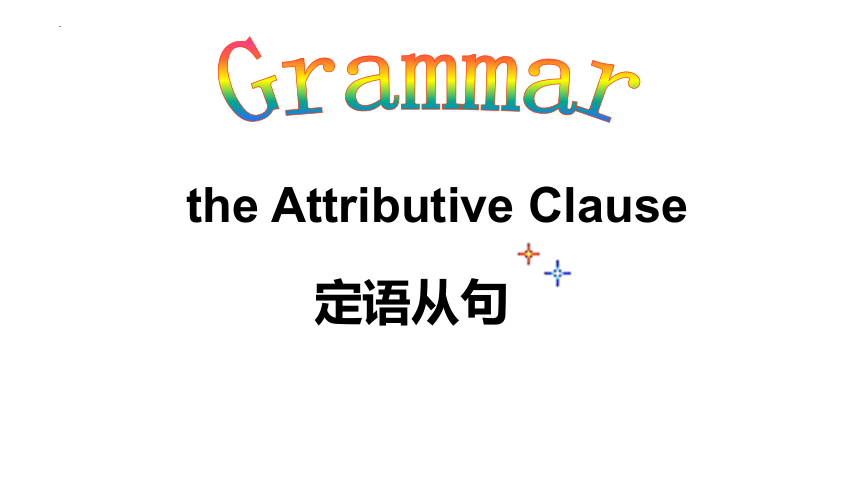 | |
| 格式 | zip | ||
| 文件大小 | 5.4MB | ||
| 资源类型 | 教案 | ||
| 版本资源 | 通用版 | ||
| 科目 | 英语 | ||
| 更新时间 | 2022-04-08 11:31:05 | ||
图片预览

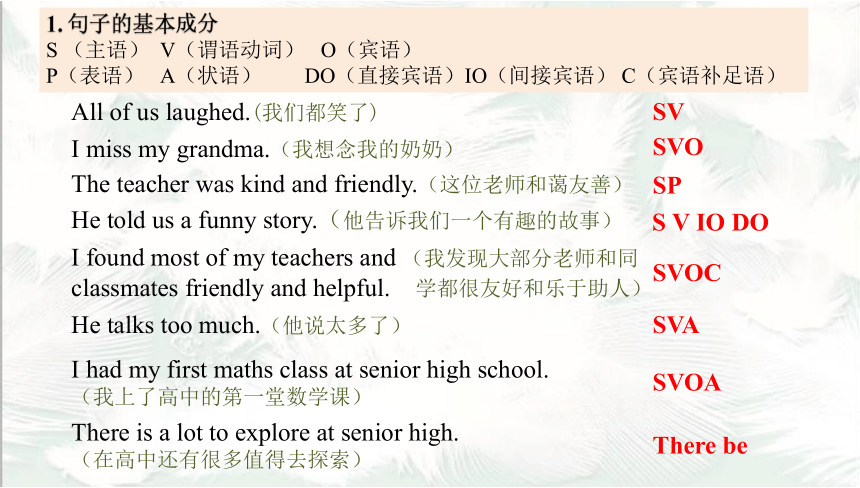
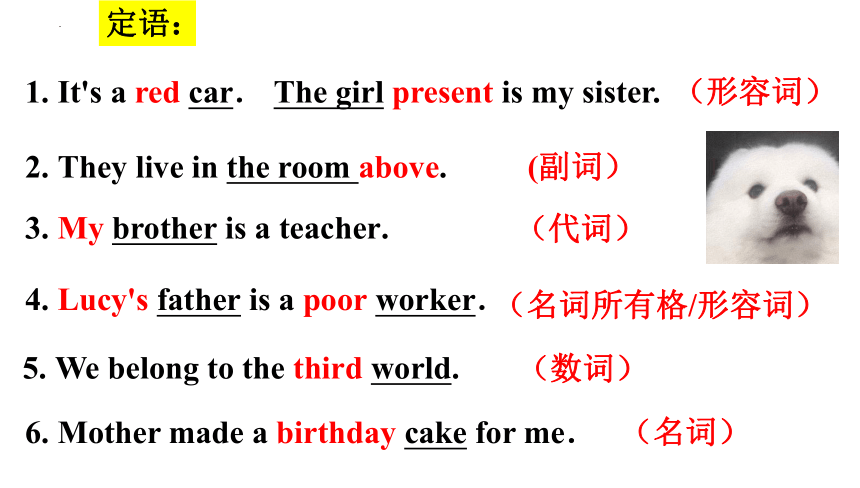
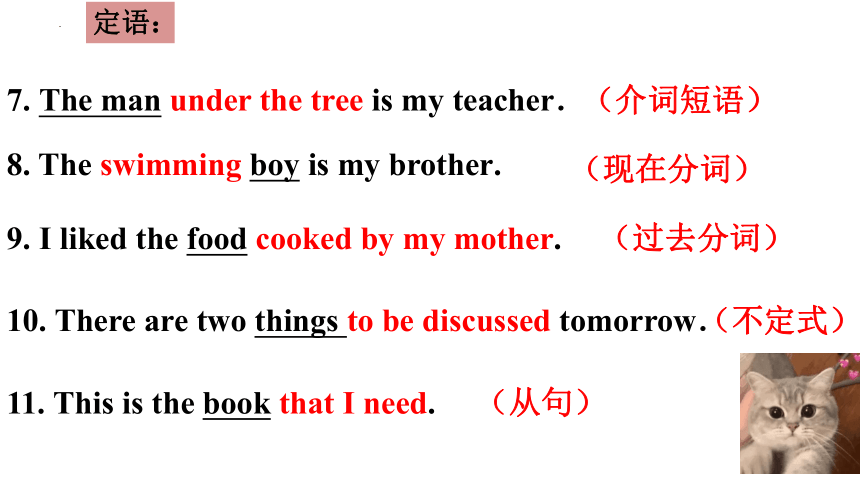
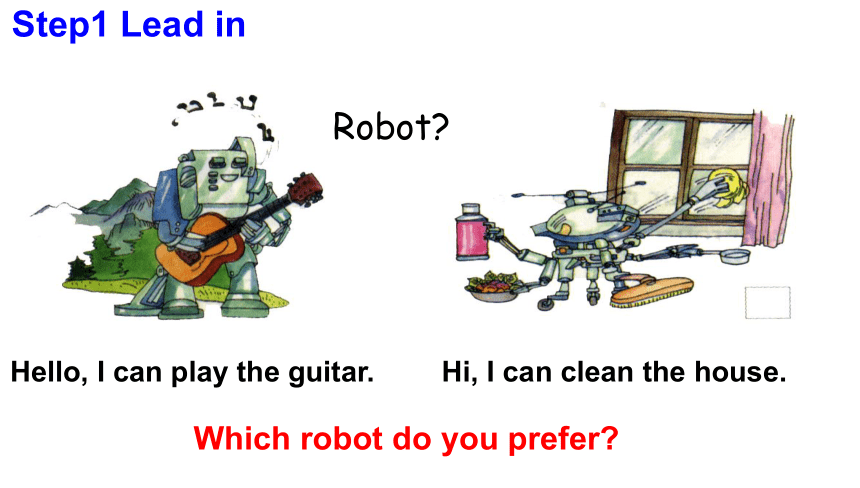
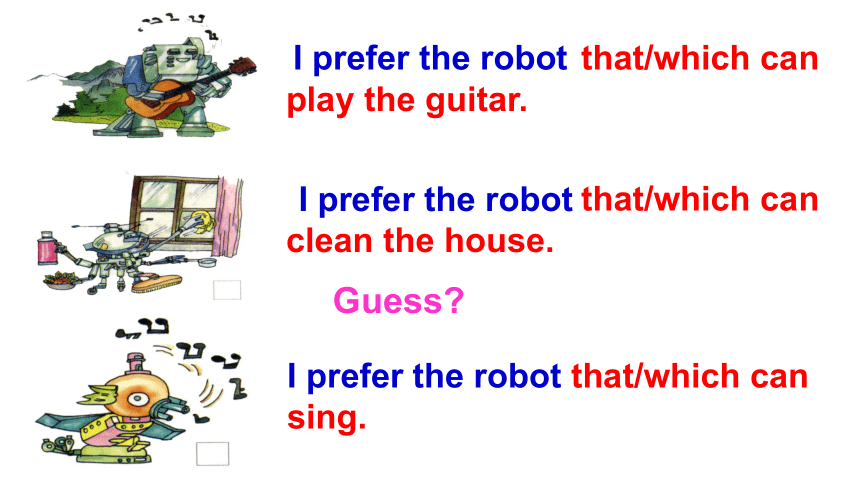
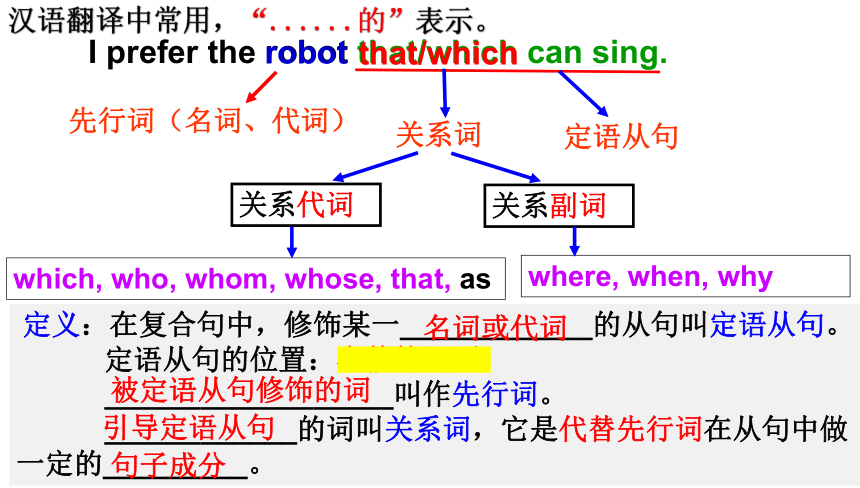
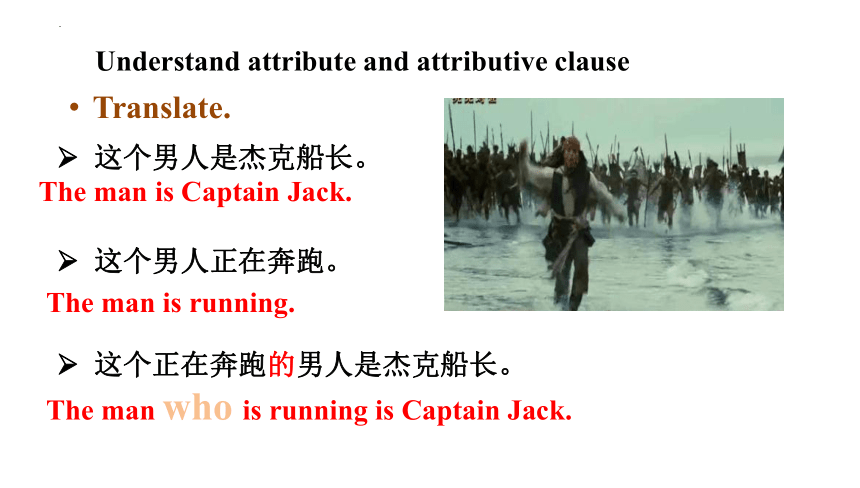
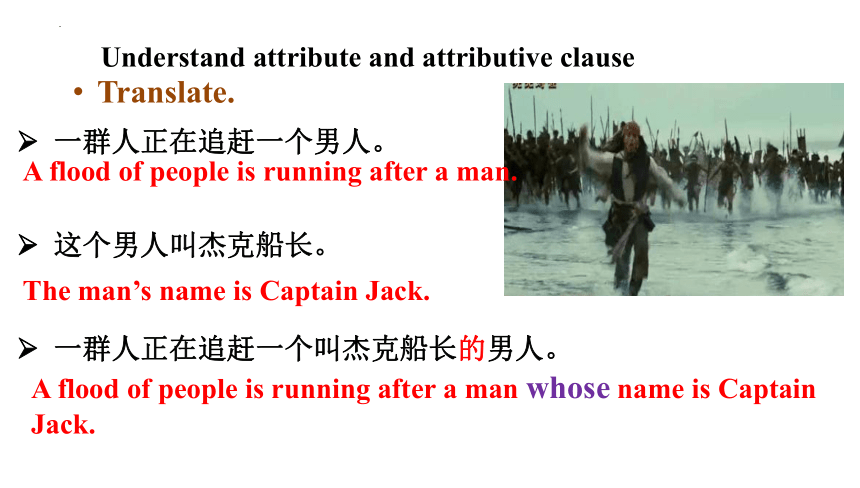
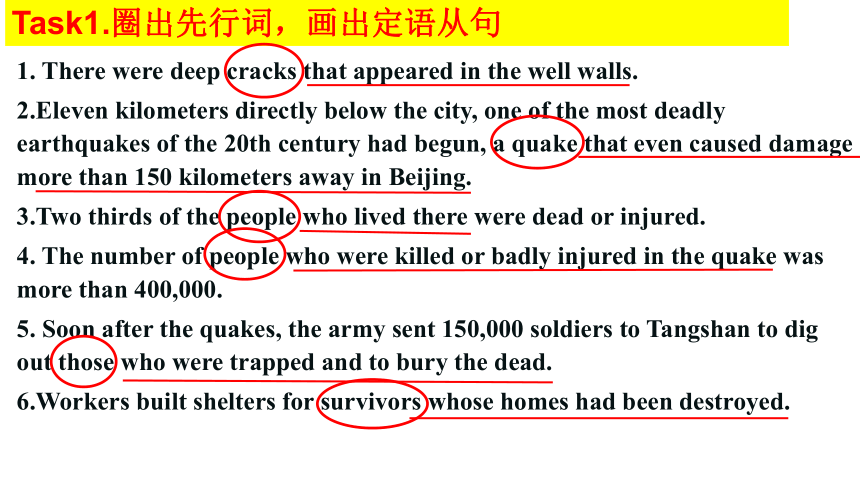
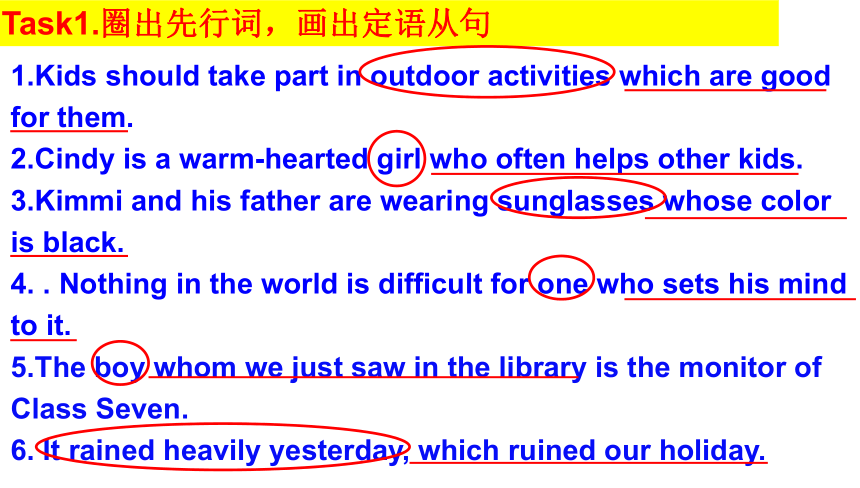
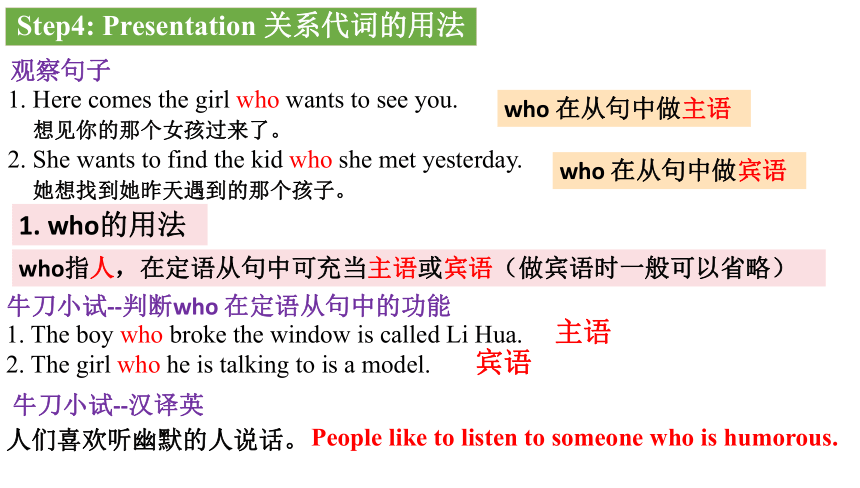
文档简介
(共52张PPT)
the Attributive Clause
Grammar
定语从句
SV
SVO
SP
S V IO DO
SVOC
SVOA
SVA
There be
All of us laughed.(我们都笑了)
I miss my grandma.(我想念我的奶奶)
The teacher was kind and friendly.(这位老师和蔼友善)
He told us a funny story.(他告诉我们一个有趣的故事)
I found most of my teachers and (我发现大部分老师和同 classmates friendly and helpful. 学都很友好和乐于助人)
He talks too much.(他说太多了)
I had my first maths class at senior high school.
(我上了高中的第一堂数学课)
There is a lot to explore at senior high.
(在高中还有很多值得去探索)
1. 句子的基本成分
S (主语) V(谓语动词) O(宾语)
P(表语) A(状语) DO(直接宾语)IO(间接宾语) C(宾语补足语)
定语:
6. Mother made a birthday cake for me.
4. Lucy's father is a poor worker.
5. We belong to the third world.
3. My brother is a teacher.
2. They live in the room above.
1. It's a red car. The girl present is my sister.
(形容词)
(副词)
(代词)
(数词)
(名词所有格/形容词)
(名词)
定语:
11. This is the book that I need.
10. There are two things to be discussed tomorrow.
9. I liked the food cooked by my mother.
8. The swimming boy is my brother.
7. The man under the tree is my teacher.
(介词短语)
(现在分词)
(过去分词)
(不定式)
(从句)
Which robot do you prefer
Robot
Hello, I can play the guitar.
Hi, I can clean the house.
Step1 Lead in
that/which can play the guitar.
I prefer the robot that/which can sing.
Guess
that/which can clean the house.
I prefer the robot
I prefer the robot
I prefer the robot that/which can sing.
定义:在复合句中,修饰某一____________的从句叫定语从句。
定语从句的位置:在修饰词后
__________________叫作先行词。
____________的词叫关系词,它是代替先行词在从句中做一定的_________。
名词或代词
被定语从句修饰的词
引导定语从句
汉语翻译中常用,“......的”表示。
先行词(名词、代词)
关系词
定语从句
关系代词
关系副词
which, who, whom, whose, that, as
where, when, why
that/which
robot
句子成分
Understand attribute and attributive clause
Translate.
这个男人是杰克船长。
这个男人正在奔跑。
这个正在奔跑的男人是杰克船长。
The man is Captain Jack.
The man is running.
The man who is running is Captain Jack.
Understand attribute and attributive clause
Translate.
一群人正在追赶一个男人。
这个男人叫杰克船长。
一群人正在追赶一个叫杰克船长的男人。
A flood of people is running after a man.
The man’s name is Captain Jack.
A flood of people is running after a man whose name is Captain Jack.
1. There were deep cracks that appeared in the well walls.
2.Eleven kilometers directly below the city, one of the most deadly earthquakes of the 20th century had begun, a quake that even caused damage more than 150 kilometers away in Beijing.
3.Two thirds of the people who lived there were dead or injured.
4. The number of people who were killed or badly injured in the quake was more than 400,000.
5. Soon after the quakes, the army sent 150,000 soldiers to Tangshan to dig out those who were trapped and to bury the dead.
6.Workers built shelters for survivors whose homes had been destroyed.
Task1.圈出先行词,画出定语从句
1.Kids should take part in outdoor activities which are good for them.
2.Cindy is a warm-hearted girl who often helps other kids.
3.Kimmi and his father are wearing sunglasses whose color is black.
4. . Nothing in the world is difficult for one who sets his mind to it.
5.The boy whom we just saw in the library is the monitor of Class Seven.
6. It rained heavily yesterday, which ruined our holiday.
Task1.圈出先行词,画出定语从句
Step4: Presentation 关系代词的用法
1. who的用法
观察句子
1. Here comes the girl who wants to see you.
想见你的那个女孩过来了。
2. She wants to find the kid who she met yesterday.
她想找到她昨天遇到的那个孩子。
who 在从句中做主语
who 在从句中做宾语
who指人,在定语从句中可充当主语或宾语(做宾语时一般可以省略)
牛刀小试--判断who 在定语从句中的功能
1. The boy who broke the window is called Li Hua.
2. The girl who he is talking to is a model.
主语
宾语
牛刀小试--汉译英
人们喜欢听幽默的人说话。
People like to listen to someone who is humorous.
Step4: Presentation 关系代词的用法
观察句子
1. Rose is the person (who/whom) you should care about.
罗丝是你应该关心的人。
2. Mr. Brown is the professor to whom you should write.
布朗先生是你应该给他写信的教授。
who/whom 在从句中做宾语
whom 在从句中做宾语
2. whom的用法
whom指人,在定语从句中可充当宾语,或用作从句中介词的宾语(介词放于句末时可省略,也可与who替换,若介词位于whom前,则既不能省略也不能与who替换)
牛刀小试
When I have trouble, he is the only one to _______ I can get help for.
whom
幸运的是,我认识的人没有一个在地震中丧生。(汉译英)
Luckily none of the people whom I know were killed in the earthquake .
Step4: Presentation 关系代词的用法
观察句子
1.They rushed over to help the man whose car had broken.
那个人的车坏了,他们都冲过去帮忙。
2. Please pass me the book whose cover is green.
请递给我那本绿色封皮的书。
whose指人, 在从句中做定语
whose指物, 在从句中做定语
3. whose的用法
whose 既可指人,也可指物,表示所属关系,在定语从句中做定语,常与它修饰的名词出现在从句的句首。
牛刀小试--汉译英
1.我隔壁住着一对夫妻,他们的孩子很有礼貌。
I live next door to a couple whose children are very polite.
2.桌上那些封面闪闪发光的书是给我们的奖励。
The books on the desk, whose covers are shiny, are prizes for us.
Step4: Presentation 关系代词的用法
观察句子
1. China is a country which has a long history.
中国是一个历史悠久的国家。
2. The package (which) you are carrying is about to fall.
你拿的包裹快掉了。
3. This is the house which I once lived in. 这是我曾经住过的房子。
which指物, 在从句中做主语
which指物, 在从句中做宾语
4. which的用法
which 一般指物,在定语从句中做主语,宾语或介词的宾语,作宾语时一般可省略。
which做介词in的宾语
牛刀小试--汉译英
1.他在找一家卖玩具的商店。
He is looking for a shop which sells toys.
主语
2.这正是你在找的书。
This is the book (which) you are looking for.
宾语
Step4: Presentation 关系代词的用法
观察句子
1. A plane is a machine that can fly.
飞机是一种会飞的机器。
2. The book (that) I bought yesterday is lost.
我昨天买的那本书丢了。
3. Let’s ask the man that is reading the book there
让我们问问在那里看书的那个人。
4. The girl (that) we saw yesterday is Jim’s sister.
我们昨天见到的那个女孩是吉姆的妹妹。
that指物, 在从句中做主语
that指物, 在从句中做宾语
that指人, 在从句中做宾语
that指人, 在从句中做主语
5. that的用法
that既可指人,也可指物,在定语从句中做主语或宾语,做宾语时可省略
牛刀小试--汉译英
1.每年来参观这座城市的人达一百万。
The number of people that come visit the city each year reach to one million.
2.你昨天弄坏的椅子现在正被修理。
The chair (that) you broke yesterday is now being reparied.
关系代词
Look at the kites which are flying in the sky.
The pen (which) I’m using is pretty good.
The man who is speaking at the meeting is a worker.
The woman (whom/who) they wanted to visit is a teacher.
Who’s the boy that is reading a book
Can you show me the photo (that) you like best
I know the girl whose mother is a teacher.
The house whose windows are closed is mine.
which:指物,作主语或宾语
who:指人,作主语、宾语;whom:指人,做宾语
whose:指人或物,做定语, 意为先行词的
that:指人或物,作主语或宾语
指出引导词<关系代词>在定语从句中的指代及成分
关系 代词 指代 在定语从句中所充当的成分
人 物 句子(非限制性定从) 主语 宾语 定语(的)
who
whom
which
that
whose
作宾语可以省略关系词
关系代词(代替先行词在从句中作主语、宾语、定语)
the usage of the relative pronoun
关系代词 指代 在定语从句中所充当的成分
人 物 主语 宾语 定语(的)
who
whom
which
that
whose
作宾语可以省略
She is our first lady ______ can sing songs wonderfully.
She is our first lady _______ we all admire and respect.
She is our first lady _______ elegance (优雅) impresses the world.
whom
whose
who
that
(that/who)
课文原句感知
观察句子:用适当的关系代词填空并体会其语法特征
1. There were deep cracks ________ appeared in the well walls.
2. Two thirds of the people ________ lived there were dead or injured.
3. The number of people ________ were killed or badly injured in the quake was more than 400,000.
4. Soon after the quakes, the army sent 150,000 soldiers to Tangshan to dig out those ________were trapped and to bury the dead.
5. Workers built shelters for survivors ________ homes had been destroyed.
6. A doctor ________ James used to work with died in the 2016 earthquake in Ecuador.
that/which
who/that
who/that
who
whose
whom/who/that
1.Love is a wonder ________ takes my breath away.
2.The love _________ you give me makes me rely on you.
3.The strong wind is blowing at people_________fall in love. 4.The classroom ______ door is broken will soon be repaired. 5.You are the man ______________I am looking for.
6.There is a girl_______ name is Xiaowei.
which/that
which/that
whose
who/that
whom/that/who
whose
做题技巧:
1. 确定定语从句
2.看先行词是指人还是指物
3. 确定先行词在定语从句中做的成分
4. 确定关系词
that or which?
1. that和which在指物的情况下一般都可以互换, 但在下列情况下, 一般用that而不用which。
I am sure she has something (that) you can borrow.
I’ve read all the books that are not mine.
This is the first book (that) he has read.
This is the very book that belongs to him.
(1) 先行词为all, everything, nothing, something,anything, little, much 等不定代词时。
(2)先行词被all, every, no, some, any, little, much等修饰时。
(3)先行词被序数词或最高级修饰时。
(4)先行词被the only, the very, the same, the last修饰时。
只用that不用which的情况-----阳光课堂P81
(5)先行词同时指人和指物时,用that。
He talked about the teachers and schools (that) he had visited.
(6)在who, which的特殊疑问句中含有定语从句,用that来引导定语从句。 Which is the book that you bought last week
1. He told me everything _____ he knows.
2. All the books _____ you offered have been given out.
3. This is the best film __ I have ever read.
4. We talked about the persons and things _____we remembered.
5. He is the only man _____I want to see.
6. Who is the man ___ is making a speech
用恰当的关系词填写
that
观察句子
1. All that can be done has been done.
2. This is the best way that is used to solve the problem.
3. This is the first book that he has read.
4. Please send us any information that you have about the subject.
5. The famous writer and his works that the radio has been broadcasting are popular with the students.
先行词为all,nothing,anything等不定代词
先行词被any, each, few, no, some, 等修饰时。
先行词为序数词或形容词最高级;先行词被序数词或形容词最高级修饰时。
先行词既有人又有物时
6. 只用that不用which的情况
牛刀小试--汉译英
1.这是我见过的最美丽的城市。
It is the most beautiful city that I’ve ever seen.
2.我肯定她有东西可以借你。
I am sure she has something that you can borrow.
2. 下列情况不能使用that,而用which
① that 不能引导非限制性定语从句
Football, which is a very interesting game, is played all over the world.
② that不能置于介词之后(介词后指物用which,指人用whom)
The person ________I am speaking just now is our English teacher.
The prize ________he worked so hard was a new bicycle.
to whom
for which
Could you still remember the day when we met first
This is the factory where my father works
Do you know the reason why he was late for school
the day
the factory
the reason
when
where
(指时间,作状语)
(指地点,作状语)
(指原因,作状语)
关系副词
why
关系副词 指代 在成分从句充当的成分
when
where
why
时间
时间状语
地点
原因reason
地点状语
原因状语
关系副词(代替先行词在从句中状语)=介词+关系代词
=on which
=in which
=for which
=(in/on/during…+which)
=(in/under/at…+which)
=(for which)
1.when引导定语从句的用法
(1)当先行词是表示时间的名词(如time, day, year, month, week等),
且关系词在从句中作时间状语时,定语从句用when引导。
1.Winter is the time of year when the day is short while the night is long.
2.She is looking forward to the day when her daughter wins a gold medal at the Olympics.
冬天是一年中昼短夜长的时候。
她盼望有一天她的女儿能在奥运会上赢得金牌。
Do you still remember the days _______ we chatted with each other all night?
Do you still remember the days __________we spent together on the farm?
(that/which)
when
[即学即练]
(1)We have entered into an age ________dreams have the best chance of coming true.
(2) The exact year ____________Angela and her family spent together in China was 2008.
when
which/that
(1)Their child is at the stage _____ she can say some words but not full sentences.(2)Self driving is an area ______ China and the rest of the world are on the same starting line.
(3)By opening a novel, I can enter into a wonderful world _______ I am a new character.
2.where引导定语从句的用法
(1)当先行词是表示具体地点的名词(如place, room, mountain, airport等)或表示抽象地点的名词(如case, state, condition, point, situation等),且关系词在从句中作地点状语时,定语从句用where引导。
We have reached a park where there are a variety of flowers.
He gets into a situation where it is hard to tell what is right or wrong.
我们已经一个有各种各样的花的公园。
他陷入一种难以判断对错的境地。
His father works in a factory___________ makes radio parts.
which/that
where
where
where
3.why引导定语从句的用法(1)当先行词是表示原因的名词reason,且关系词在从句中作原因状语时,定语从句用why引导,且只能引导限制性定语从句。This is the reason why he left in a hurry.
这就是他匆匆离去的原因。
The reason _________ he told me yesterday is a lie.
that/which
[即学即练] 语法填空(1) There are several reasons ________ school uniforms are a good idea. First of all, uniforms help the school look smart.(2)However, there are a number of other reasons ________ might explain why you want to garden.
why
that/which
用正确的关系副词填空。
1. I cannot forget the day _______ I first visited the Great wall.
2. This is the house ________ they lived in their childhood.
3. The reason _____ I admire him is that he often works hard.
4. Today, we’ll discuss a number of situations ________ beginners of English fail to use the language properly.
when
where
why
where
1. The reason ___________ he gave us sounded reasonable.
2. I don’t know the reason _______ he quarreled with you.
3. I’ll never forget the day ___________ we spent together.
4. I’ll remember the day _________ we stayed together.
5. This is the hotel ____________ we visited last year.
6. This is the hotel _________ Lincoln once lived.
1. The reason ___________ he gave us sounded reasonable.
2. I don’t know the reason _______ he quarreled with you.
3. I’ll never forget the day ___________ we spent together.
4. I’ll remember the day _________ we stayed together.
5. This is the hotel ____________ we visited last year.
6. This is the hotel _________ Lincoln once lived.
why
that/which
that/which
when
that/which
where
关系代词和关系副词的区别
用含有关系副词引导的定语从句合并下列句子
1.I'll never forget the days. We studied together then on that day.
→____________________________________________________________
2. Give me one good reason. I should help you for the reason.
→_____________________________________________________________
3.She is going to live in China. She has some close friends in China.
→_______________________________________________________________
She is going to live in China where she has some close friends.
I'll never forget the days when we studied together.
Give me one good reason why I should help you.
用含有关系副词引导的定语从句合并下列句子
1.The house was built about 100 years ago. My grandparents still live in it.
→____________________________________________________________
2. Do you still remember the day We first met on that day.
→_____________________________________________________________
3.Why is grass green The reason was a mystery to the little boy.
→_______________________________________________________________
The reason why grass is green was a mystery to the little boy.
The house where my grandparents still live was built about 100 years ago.
Do you still remember the day when we first met
总结关系词的用法:
关系词在定语从句中做_____________________时,用关系代词(which, who, whom, that, whose)引导定语从句。
关系词在定语从句中做_________时,用关系副词(when, where, why)引导定语从句。
主语、宾语、或定语
状语
1.关系词在定语从句中所做得成分:
2.根据从句的谓语动词判断:
若是及物动词,后面无宾语,则用关系代词;若是不及物动词,则用关系副词。
1. I cannot forget the year _______ I first went to the Great Wall.
2. The house _______ I lived ten years ago has been pulled down.
5. The factory _____ makes computers is far away from here.
6. I visited a scientist ______ name is known all over the country.
7. This is the pen _______ he bought yesterday.
8. We all want to know the reason ____ you left without a word.
9. Yesterday I helped an old man ______ had lost his way.
Practice more
when
where
which/that
whose
which/that
why
who/that
A: "Super student" is a hardworking student.
Super student is a hardworking person_________
we can learn a lot.
from whom
B: We can learn a lot from him or her.
A: "Study bubble" may be a lazy student.
B:Teachers should provide encouragement for him or her.
Study bubbl may be a lazy student ________
teachers should provide encouragement.
for whom
1.He still remembers the day on which we went out for the first time.
1.介词和先行词的关系
他仍记得我们第一次约会的那一天。
2.The car into which a truck had knocked last night was destroyed.
2.从句的谓语动词
昨晚与一辆卡车相撞的汽车报废了。
3.I have many friends, the tallest of whom is Li Hui.
3.句子意义
我有许多朋友,其中最高的一个是李辉。
考点2 介词的选择:
总结
“介词+关系代词”
⑴先行词是
⑵选介词
介词+whom
介词+which
人
物
①介词与先行词的关系
②从句里谓语动词或形容
词的固定搭配
③主从句所表达的意义
定语从句:介词+关系代词
在“介词+关系代词”引导的定语从句中,关系代词只能用which或whom。先行词指物时,用which;先行词指人时,用whom。在这个结构中,介词的使用原则是:
1. Do you like the book ________ she spent $10.
2. Do you like the book _________ she paid $10.
3. Do you like the book___________she talks
4. The man ________ I spoke is good at writing.
5. China is a beautiful country, ________ we are proud.
6. The factory produces a million pairs of shoes every year, 80% _________ are sold abroad.
7. Two men, neither _________ I had ever seen before, came to my office.
on which
for which
about which
to whom
of which
of which
of whom
Practice more
表“所有”关系或“整体中的一部分”时,用of
1.He is the kind of person. He always feels happy.
Combine and Think
He is the kind of person who/that always feels happy.
2.It is an interesting show. I have seen it in recent years.
It is an interseting show which/that I have seen in recent years.
3.The prize will go to the writer. His story shows the most imagination.
The prize will go to the writer whose story shows the most imagination.
It
it
the writer
His
Writing
Step5 Summary
关系 代词 先行词 指代 在从句中
的成分
that
which
who
whom
whose (=of which) (=of whom)
人/物
主/宾
主/宾
主/宾
宾语
定语
人
人
物/人
物
关系 副词 指代 在成分从句
充当的成分
when
where
why
时间
时间状语
地点
原因reason
地点状语
原因状语
一、非限制性与限制性定语从句的区别
1.作用不同 2.形式不同 3.先行词不同 4.关系词的使用情况有所不同
二:as 和 which 在非限制定语从句中的区别
1.as和which引导的非限制性定语从句时, as指代整个主句, 而which引导的非限制性定语从句时,先行词既可以是整个主句,又可以是主句的一部分。 as引导的从句可放在主句之前、之后或中间,而which引导的从句只能放在放在先行词后面.另外,as有“正如 ,正像 ”的意思 , which常译为“这,那”
2.当先行词受such\so, the same修饰时,常用as引导限制性定语从句,注意such\so…that …引导结果状语从句; the same…as与the same…that…表达不一样。
考点1 whose:
引导定语从句,在从句中做定语,先行词既可以指代人,也可以指代物,whose之后的名词与先行词之间为所属关系,表示“……的” 先行词指代物时,可以与the+n. of which 或者of which the +n. 替换
This is the book whose cover is blue.
This is the book of which the cover is blue.
This is the book the cover of which is blue.
1. He is reading a book.
2. Its name is Gone with the Wind .
他正在看一本名叫《飘》的书。
He is reading a book whose name is Gone with the Wind .
He is reading a book the name of which is Gone with the Wind .
He is reading a book of which the name is Gone with the Wind .
3 使用定语从句的注意事项
(1)关系代词在定语从句中作主语时,定语从句的谓语动词要和先行词的数保持一致。
The boy who is reading the story is my brother. 正在读这个故事的那个男孩是我弟弟。
【误区警示】
“ one of +复数名词”作先行词,从句谓语动词用复数形式;“the only one of +复数名词”作先行词,从句谓语动词用单数形式。
This is one of the rooms that are free now. 这是目前空着的房间之一。
He is the only one of those workers who is able to do this job.
他是那些工人中唯一能做此工作的人。
(2)为避免关系词的重复,被关系代词所代替的成分不可在从句中重复出现。
This is the factory which we visited yesterday. 这是我们昨天参观过的工厂。
单句语法填空
(1) The old town has narrow streets and small houses that ________(be)built close to each other.
(2) I’m fond of the piece of music which ________(be) popular with the teenagers.
(3) He is one of the students who ________(have)a good command of French.
(4) He is the only one of the students who ________(have)a good command of French.
are
is
have
has
注意事项
He had to face the condition where pressure was heavy.
They have reached the point where they have to separate with each other.
It’s helpful to put children in a situation where they can see themselves differently.
当先行词是case, condition, situation, position, point, stage, degree,occasion等词,表示情况、方面、处境时用关系副词where。
1. The earthquake ___________ hit the city in 1906
was the biggest in American history.
2. We don’t know the number of people ____ lost their
homes in 1906 earthquake.
3. The house __________ they built in 1987 stayed
up in the earthquake.
4. A house __________ is built on sand may fall
down in an earthquake.
5. Luckily none of the people _____________ I know
were killed in the earthquake.
that / which
who
一、用 who, whom, that, which or whose填空。
that / which
that / which
who/whom/that
Exercise
6.The old town has narrow streets and small houses ___________ are built close to each other.
7.She has a gift for creating an atmosphere for her students ___________ allows them to communicate freely with each other.
8.The prize will go to the writer ___________ story shows the most imagination.
9.I've become good friends with several of the students in my school _______________ I met in the English speech contest last year.
10.—Do you have anything to say for yourselves
—Yes, there's one point ___________ we must insist on.
that / which
that / which
whose
who/whom/that
that / which
11.I refuse to accept the blame for something ___________ was someone else's fault.
12.Jack is the most intelligent man ________________ I've ever met.
13.As a child, Jack studied in a village school, ___________ is named after his grandfather.
14.Barbara is easy to recognize as she's the only one of the women who ___________ (wear) evening dress.
15.I have the same magazine ___________ you bought just now.
who/whom/that
that
which
wears
as
the Attributive Clause
Grammar
定语从句
SV
SVO
SP
S V IO DO
SVOC
SVOA
SVA
There be
All of us laughed.(我们都笑了)
I miss my grandma.(我想念我的奶奶)
The teacher was kind and friendly.(这位老师和蔼友善)
He told us a funny story.(他告诉我们一个有趣的故事)
I found most of my teachers and (我发现大部分老师和同 classmates friendly and helpful. 学都很友好和乐于助人)
He talks too much.(他说太多了)
I had my first maths class at senior high school.
(我上了高中的第一堂数学课)
There is a lot to explore at senior high.
(在高中还有很多值得去探索)
1. 句子的基本成分
S (主语) V(谓语动词) O(宾语)
P(表语) A(状语) DO(直接宾语)IO(间接宾语) C(宾语补足语)
定语:
6. Mother made a birthday cake for me.
4. Lucy's father is a poor worker.
5. We belong to the third world.
3. My brother is a teacher.
2. They live in the room above.
1. It's a red car. The girl present is my sister.
(形容词)
(副词)
(代词)
(数词)
(名词所有格/形容词)
(名词)
定语:
11. This is the book that I need.
10. There are two things to be discussed tomorrow.
9. I liked the food cooked by my mother.
8. The swimming boy is my brother.
7. The man under the tree is my teacher.
(介词短语)
(现在分词)
(过去分词)
(不定式)
(从句)
Which robot do you prefer
Robot
Hello, I can play the guitar.
Hi, I can clean the house.
Step1 Lead in
that/which can play the guitar.
I prefer the robot that/which can sing.
Guess
that/which can clean the house.
I prefer the robot
I prefer the robot
I prefer the robot that/which can sing.
定义:在复合句中,修饰某一____________的从句叫定语从句。
定语从句的位置:在修饰词后
__________________叫作先行词。
____________的词叫关系词,它是代替先行词在从句中做一定的_________。
名词或代词
被定语从句修饰的词
引导定语从句
汉语翻译中常用,“......的”表示。
先行词(名词、代词)
关系词
定语从句
关系代词
关系副词
which, who, whom, whose, that, as
where, when, why
that/which
robot
句子成分
Understand attribute and attributive clause
Translate.
这个男人是杰克船长。
这个男人正在奔跑。
这个正在奔跑的男人是杰克船长。
The man is Captain Jack.
The man is running.
The man who is running is Captain Jack.
Understand attribute and attributive clause
Translate.
一群人正在追赶一个男人。
这个男人叫杰克船长。
一群人正在追赶一个叫杰克船长的男人。
A flood of people is running after a man.
The man’s name is Captain Jack.
A flood of people is running after a man whose name is Captain Jack.
1. There were deep cracks that appeared in the well walls.
2.Eleven kilometers directly below the city, one of the most deadly earthquakes of the 20th century had begun, a quake that even caused damage more than 150 kilometers away in Beijing.
3.Two thirds of the people who lived there were dead or injured.
4. The number of people who were killed or badly injured in the quake was more than 400,000.
5. Soon after the quakes, the army sent 150,000 soldiers to Tangshan to dig out those who were trapped and to bury the dead.
6.Workers built shelters for survivors whose homes had been destroyed.
Task1.圈出先行词,画出定语从句
1.Kids should take part in outdoor activities which are good for them.
2.Cindy is a warm-hearted girl who often helps other kids.
3.Kimmi and his father are wearing sunglasses whose color is black.
4. . Nothing in the world is difficult for one who sets his mind to it.
5.The boy whom we just saw in the library is the monitor of Class Seven.
6. It rained heavily yesterday, which ruined our holiday.
Task1.圈出先行词,画出定语从句
Step4: Presentation 关系代词的用法
1. who的用法
观察句子
1. Here comes the girl who wants to see you.
想见你的那个女孩过来了。
2. She wants to find the kid who she met yesterday.
她想找到她昨天遇到的那个孩子。
who 在从句中做主语
who 在从句中做宾语
who指人,在定语从句中可充当主语或宾语(做宾语时一般可以省略)
牛刀小试--判断who 在定语从句中的功能
1. The boy who broke the window is called Li Hua.
2. The girl who he is talking to is a model.
主语
宾语
牛刀小试--汉译英
人们喜欢听幽默的人说话。
People like to listen to someone who is humorous.
Step4: Presentation 关系代词的用法
观察句子
1. Rose is the person (who/whom) you should care about.
罗丝是你应该关心的人。
2. Mr. Brown is the professor to whom you should write.
布朗先生是你应该给他写信的教授。
who/whom 在从句中做宾语
whom 在从句中做宾语
2. whom的用法
whom指人,在定语从句中可充当宾语,或用作从句中介词的宾语(介词放于句末时可省略,也可与who替换,若介词位于whom前,则既不能省略也不能与who替换)
牛刀小试
When I have trouble, he is the only one to _______ I can get help for.
whom
幸运的是,我认识的人没有一个在地震中丧生。(汉译英)
Luckily none of the people whom I know were killed in the earthquake .
Step4: Presentation 关系代词的用法
观察句子
1.They rushed over to help the man whose car had broken.
那个人的车坏了,他们都冲过去帮忙。
2. Please pass me the book whose cover is green.
请递给我那本绿色封皮的书。
whose指人, 在从句中做定语
whose指物, 在从句中做定语
3. whose的用法
whose 既可指人,也可指物,表示所属关系,在定语从句中做定语,常与它修饰的名词出现在从句的句首。
牛刀小试--汉译英
1.我隔壁住着一对夫妻,他们的孩子很有礼貌。
I live next door to a couple whose children are very polite.
2.桌上那些封面闪闪发光的书是给我们的奖励。
The books on the desk, whose covers are shiny, are prizes for us.
Step4: Presentation 关系代词的用法
观察句子
1. China is a country which has a long history.
中国是一个历史悠久的国家。
2. The package (which) you are carrying is about to fall.
你拿的包裹快掉了。
3. This is the house which I once lived in. 这是我曾经住过的房子。
which指物, 在从句中做主语
which指物, 在从句中做宾语
4. which的用法
which 一般指物,在定语从句中做主语,宾语或介词的宾语,作宾语时一般可省略。
which做介词in的宾语
牛刀小试--汉译英
1.他在找一家卖玩具的商店。
He is looking for a shop which sells toys.
主语
2.这正是你在找的书。
This is the book (which) you are looking for.
宾语
Step4: Presentation 关系代词的用法
观察句子
1. A plane is a machine that can fly.
飞机是一种会飞的机器。
2. The book (that) I bought yesterday is lost.
我昨天买的那本书丢了。
3. Let’s ask the man that is reading the book there
让我们问问在那里看书的那个人。
4. The girl (that) we saw yesterday is Jim’s sister.
我们昨天见到的那个女孩是吉姆的妹妹。
that指物, 在从句中做主语
that指物, 在从句中做宾语
that指人, 在从句中做宾语
that指人, 在从句中做主语
5. that的用法
that既可指人,也可指物,在定语从句中做主语或宾语,做宾语时可省略
牛刀小试--汉译英
1.每年来参观这座城市的人达一百万。
The number of people that come visit the city each year reach to one million.
2.你昨天弄坏的椅子现在正被修理。
The chair (that) you broke yesterday is now being reparied.
关系代词
Look at the kites which are flying in the sky.
The pen (which) I’m using is pretty good.
The man who is speaking at the meeting is a worker.
The woman (whom/who) they wanted to visit is a teacher.
Who’s the boy that is reading a book
Can you show me the photo (that) you like best
I know the girl whose mother is a teacher.
The house whose windows are closed is mine.
which:指物,作主语或宾语
who:指人,作主语、宾语;whom:指人,做宾语
whose:指人或物,做定语, 意为先行词的
that:指人或物,作主语或宾语
指出引导词<关系代词>在定语从句中的指代及成分
关系 代词 指代 在定语从句中所充当的成分
人 物 句子(非限制性定从) 主语 宾语 定语(的)
who
whom
which
that
whose
作宾语可以省略关系词
关系代词(代替先行词在从句中作主语、宾语、定语)
the usage of the relative pronoun
关系代词 指代 在定语从句中所充当的成分
人 物 主语 宾语 定语(的)
who
whom
which
that
whose
作宾语可以省略
She is our first lady ______ can sing songs wonderfully.
She is our first lady _______ we all admire and respect.
She is our first lady _______ elegance (优雅) impresses the world.
whom
whose
who
that
(that/who)
课文原句感知
观察句子:用适当的关系代词填空并体会其语法特征
1. There were deep cracks ________ appeared in the well walls.
2. Two thirds of the people ________ lived there were dead or injured.
3. The number of people ________ were killed or badly injured in the quake was more than 400,000.
4. Soon after the quakes, the army sent 150,000 soldiers to Tangshan to dig out those ________were trapped and to bury the dead.
5. Workers built shelters for survivors ________ homes had been destroyed.
6. A doctor ________ James used to work with died in the 2016 earthquake in Ecuador.
that/which
who/that
who/that
who
whose
whom/who/that
1.Love is a wonder ________ takes my breath away.
2.The love _________ you give me makes me rely on you.
3.The strong wind is blowing at people_________fall in love. 4.The classroom ______ door is broken will soon be repaired. 5.You are the man ______________I am looking for.
6.There is a girl_______ name is Xiaowei.
which/that
which/that
whose
who/that
whom/that/who
whose
做题技巧:
1. 确定定语从句
2.看先行词是指人还是指物
3. 确定先行词在定语从句中做的成分
4. 确定关系词
that or which?
1. that和which在指物的情况下一般都可以互换, 但在下列情况下, 一般用that而不用which。
I am sure she has something (that) you can borrow.
I’ve read all the books that are not mine.
This is the first book (that) he has read.
This is the very book that belongs to him.
(1) 先行词为all, everything, nothing, something,anything, little, much 等不定代词时。
(2)先行词被all, every, no, some, any, little, much等修饰时。
(3)先行词被序数词或最高级修饰时。
(4)先行词被the only, the very, the same, the last修饰时。
只用that不用which的情况-----阳光课堂P81
(5)先行词同时指人和指物时,用that。
He talked about the teachers and schools (that) he had visited.
(6)在who, which的特殊疑问句中含有定语从句,用that来引导定语从句。 Which is the book that you bought last week
1. He told me everything _____ he knows.
2. All the books _____ you offered have been given out.
3. This is the best film __ I have ever read.
4. We talked about the persons and things _____we remembered.
5. He is the only man _____I want to see.
6. Who is the man ___ is making a speech
用恰当的关系词填写
that
观察句子
1. All that can be done has been done.
2. This is the best way that is used to solve the problem.
3. This is the first book that he has read.
4. Please send us any information that you have about the subject.
5. The famous writer and his works that the radio has been broadcasting are popular with the students.
先行词为all,nothing,anything等不定代词
先行词被any, each, few, no, some, 等修饰时。
先行词为序数词或形容词最高级;先行词被序数词或形容词最高级修饰时。
先行词既有人又有物时
6. 只用that不用which的情况
牛刀小试--汉译英
1.这是我见过的最美丽的城市。
It is the most beautiful city that I’ve ever seen.
2.我肯定她有东西可以借你。
I am sure she has something that you can borrow.
2. 下列情况不能使用that,而用which
① that 不能引导非限制性定语从句
Football, which is a very interesting game, is played all over the world.
② that不能置于介词之后(介词后指物用which,指人用whom)
The person ________I am speaking just now is our English teacher.
The prize ________he worked so hard was a new bicycle.
to whom
for which
Could you still remember the day when we met first
This is the factory where my father works
Do you know the reason why he was late for school
the day
the factory
the reason
when
where
(指时间,作状语)
(指地点,作状语)
(指原因,作状语)
关系副词
why
关系副词 指代 在成分从句充当的成分
when
where
why
时间
时间状语
地点
原因reason
地点状语
原因状语
关系副词(代替先行词在从句中状语)=介词+关系代词
=on which
=in which
=for which
=(in/on/during…+which)
=(in/under/at…+which)
=(for which)
1.when引导定语从句的用法
(1)当先行词是表示时间的名词(如time, day, year, month, week等),
且关系词在从句中作时间状语时,定语从句用when引导。
1.Winter is the time of year when the day is short while the night is long.
2.She is looking forward to the day when her daughter wins a gold medal at the Olympics.
冬天是一年中昼短夜长的时候。
她盼望有一天她的女儿能在奥运会上赢得金牌。
Do you still remember the days _______ we chatted with each other all night?
Do you still remember the days __________we spent together on the farm?
(that/which)
when
[即学即练]
(1)We have entered into an age ________dreams have the best chance of coming true.
(2) The exact year ____________Angela and her family spent together in China was 2008.
when
which/that
(1)Their child is at the stage _____ she can say some words but not full sentences.(2)Self driving is an area ______ China and the rest of the world are on the same starting line.
(3)By opening a novel, I can enter into a wonderful world _______ I am a new character.
2.where引导定语从句的用法
(1)当先行词是表示具体地点的名词(如place, room, mountain, airport等)或表示抽象地点的名词(如case, state, condition, point, situation等),且关系词在从句中作地点状语时,定语从句用where引导。
We have reached a park where there are a variety of flowers.
He gets into a situation where it is hard to tell what is right or wrong.
我们已经一个有各种各样的花的公园。
他陷入一种难以判断对错的境地。
His father works in a factory___________ makes radio parts.
which/that
where
where
where
3.why引导定语从句的用法(1)当先行词是表示原因的名词reason,且关系词在从句中作原因状语时,定语从句用why引导,且只能引导限制性定语从句。This is the reason why he left in a hurry.
这就是他匆匆离去的原因。
The reason _________ he told me yesterday is a lie.
that/which
[即学即练] 语法填空(1) There are several reasons ________ school uniforms are a good idea. First of all, uniforms help the school look smart.(2)However, there are a number of other reasons ________ might explain why you want to garden.
why
that/which
用正确的关系副词填空。
1. I cannot forget the day _______ I first visited the Great wall.
2. This is the house ________ they lived in their childhood.
3. The reason _____ I admire him is that he often works hard.
4. Today, we’ll discuss a number of situations ________ beginners of English fail to use the language properly.
when
where
why
where
1. The reason ___________ he gave us sounded reasonable.
2. I don’t know the reason _______ he quarreled with you.
3. I’ll never forget the day ___________ we spent together.
4. I’ll remember the day _________ we stayed together.
5. This is the hotel ____________ we visited last year.
6. This is the hotel _________ Lincoln once lived.
1. The reason ___________ he gave us sounded reasonable.
2. I don’t know the reason _______ he quarreled with you.
3. I’ll never forget the day ___________ we spent together.
4. I’ll remember the day _________ we stayed together.
5. This is the hotel ____________ we visited last year.
6. This is the hotel _________ Lincoln once lived.
why
that/which
that/which
when
that/which
where
关系代词和关系副词的区别
用含有关系副词引导的定语从句合并下列句子
1.I'll never forget the days. We studied together then on that day.
→____________________________________________________________
2. Give me one good reason. I should help you for the reason.
→_____________________________________________________________
3.She is going to live in China. She has some close friends in China.
→_______________________________________________________________
She is going to live in China where she has some close friends.
I'll never forget the days when we studied together.
Give me one good reason why I should help you.
用含有关系副词引导的定语从句合并下列句子
1.The house was built about 100 years ago. My grandparents still live in it.
→____________________________________________________________
2. Do you still remember the day We first met on that day.
→_____________________________________________________________
3.Why is grass green The reason was a mystery to the little boy.
→_______________________________________________________________
The reason why grass is green was a mystery to the little boy.
The house where my grandparents still live was built about 100 years ago.
Do you still remember the day when we first met
总结关系词的用法:
关系词在定语从句中做_____________________时,用关系代词(which, who, whom, that, whose)引导定语从句。
关系词在定语从句中做_________时,用关系副词(when, where, why)引导定语从句。
主语、宾语、或定语
状语
1.关系词在定语从句中所做得成分:
2.根据从句的谓语动词判断:
若是及物动词,后面无宾语,则用关系代词;若是不及物动词,则用关系副词。
1. I cannot forget the year _______ I first went to the Great Wall.
2. The house _______ I lived ten years ago has been pulled down.
5. The factory _____ makes computers is far away from here.
6. I visited a scientist ______ name is known all over the country.
7. This is the pen _______ he bought yesterday.
8. We all want to know the reason ____ you left without a word.
9. Yesterday I helped an old man ______ had lost his way.
Practice more
when
where
which/that
whose
which/that
why
who/that
A: "Super student" is a hardworking student.
Super student is a hardworking person_________
we can learn a lot.
from whom
B: We can learn a lot from him or her.
A: "Study bubble" may be a lazy student.
B:Teachers should provide encouragement for him or her.
Study bubbl may be a lazy student ________
teachers should provide encouragement.
for whom
1.He still remembers the day on which we went out for the first time.
1.介词和先行词的关系
他仍记得我们第一次约会的那一天。
2.The car into which a truck had knocked last night was destroyed.
2.从句的谓语动词
昨晚与一辆卡车相撞的汽车报废了。
3.I have many friends, the tallest of whom is Li Hui.
3.句子意义
我有许多朋友,其中最高的一个是李辉。
考点2 介词的选择:
总结
“介词+关系代词”
⑴先行词是
⑵选介词
介词+whom
介词+which
人
物
①介词与先行词的关系
②从句里谓语动词或形容
词的固定搭配
③主从句所表达的意义
定语从句:介词+关系代词
在“介词+关系代词”引导的定语从句中,关系代词只能用which或whom。先行词指物时,用which;先行词指人时,用whom。在这个结构中,介词的使用原则是:
1. Do you like the book ________ she spent $10.
2. Do you like the book _________ she paid $10.
3. Do you like the book___________she talks
4. The man ________ I spoke is good at writing.
5. China is a beautiful country, ________ we are proud.
6. The factory produces a million pairs of shoes every year, 80% _________ are sold abroad.
7. Two men, neither _________ I had ever seen before, came to my office.
on which
for which
about which
to whom
of which
of which
of whom
Practice more
表“所有”关系或“整体中的一部分”时,用of
1.He is the kind of person. He always feels happy.
Combine and Think
He is the kind of person who/that always feels happy.
2.It is an interesting show. I have seen it in recent years.
It is an interseting show which/that I have seen in recent years.
3.The prize will go to the writer. His story shows the most imagination.
The prize will go to the writer whose story shows the most imagination.
It
it
the writer
His
Writing
Step5 Summary
关系 代词 先行词 指代 在从句中
的成分
that
which
who
whom
whose (=of which) (=of whom)
人/物
主/宾
主/宾
主/宾
宾语
定语
人
人
物/人
物
关系 副词 指代 在成分从句
充当的成分
when
where
why
时间
时间状语
地点
原因reason
地点状语
原因状语
一、非限制性与限制性定语从句的区别
1.作用不同 2.形式不同 3.先行词不同 4.关系词的使用情况有所不同
二:as 和 which 在非限制定语从句中的区别
1.as和which引导的非限制性定语从句时, as指代整个主句, 而which引导的非限制性定语从句时,先行词既可以是整个主句,又可以是主句的一部分。 as引导的从句可放在主句之前、之后或中间,而which引导的从句只能放在放在先行词后面.另外,as有“正如 ,正像 ”的意思 , which常译为“这,那”
2.当先行词受such\so, the same修饰时,常用as引导限制性定语从句,注意such\so…that …引导结果状语从句; the same…as与the same…that…表达不一样。
考点1 whose:
引导定语从句,在从句中做定语,先行词既可以指代人,也可以指代物,whose之后的名词与先行词之间为所属关系,表示“……的” 先行词指代物时,可以与the+n. of which 或者of which the +n. 替换
This is the book whose cover is blue.
This is the book of which the cover is blue.
This is the book the cover of which is blue.
1. He is reading a book.
2. Its name is Gone with the Wind .
他正在看一本名叫《飘》的书。
He is reading a book whose name is Gone with the Wind .
He is reading a book the name of which is Gone with the Wind .
He is reading a book of which the name is Gone with the Wind .
3 使用定语从句的注意事项
(1)关系代词在定语从句中作主语时,定语从句的谓语动词要和先行词的数保持一致。
The boy who is reading the story is my brother. 正在读这个故事的那个男孩是我弟弟。
【误区警示】
“ one of +复数名词”作先行词,从句谓语动词用复数形式;“the only one of +复数名词”作先行词,从句谓语动词用单数形式。
This is one of the rooms that are free now. 这是目前空着的房间之一。
He is the only one of those workers who is able to do this job.
他是那些工人中唯一能做此工作的人。
(2)为避免关系词的重复,被关系代词所代替的成分不可在从句中重复出现。
This is the factory which we visited yesterday. 这是我们昨天参观过的工厂。
单句语法填空
(1) The old town has narrow streets and small houses that ________(be)built close to each other.
(2) I’m fond of the piece of music which ________(be) popular with the teenagers.
(3) He is one of the students who ________(have)a good command of French.
(4) He is the only one of the students who ________(have)a good command of French.
are
is
have
has
注意事项
He had to face the condition where pressure was heavy.
They have reached the point where they have to separate with each other.
It’s helpful to put children in a situation where they can see themselves differently.
当先行词是case, condition, situation, position, point, stage, degree,occasion等词,表示情况、方面、处境时用关系副词where。
1. The earthquake ___________ hit the city in 1906
was the biggest in American history.
2. We don’t know the number of people ____ lost their
homes in 1906 earthquake.
3. The house __________ they built in 1987 stayed
up in the earthquake.
4. A house __________ is built on sand may fall
down in an earthquake.
5. Luckily none of the people _____________ I know
were killed in the earthquake.
that / which
who
一、用 who, whom, that, which or whose填空。
that / which
that / which
who/whom/that
Exercise
6.The old town has narrow streets and small houses ___________ are built close to each other.
7.She has a gift for creating an atmosphere for her students ___________ allows them to communicate freely with each other.
8.The prize will go to the writer ___________ story shows the most imagination.
9.I've become good friends with several of the students in my school _______________ I met in the English speech contest last year.
10.—Do you have anything to say for yourselves
—Yes, there's one point ___________ we must insist on.
that / which
that / which
whose
who/whom/that
that / which
11.I refuse to accept the blame for something ___________ was someone else's fault.
12.Jack is the most intelligent man ________________ I've ever met.
13.As a child, Jack studied in a village school, ___________ is named after his grandfather.
14.Barbara is easy to recognize as she's the only one of the women who ___________ (wear) evening dress.
15.I have the same magazine ___________ you bought just now.
who/whom/that
that
which
wears
as
